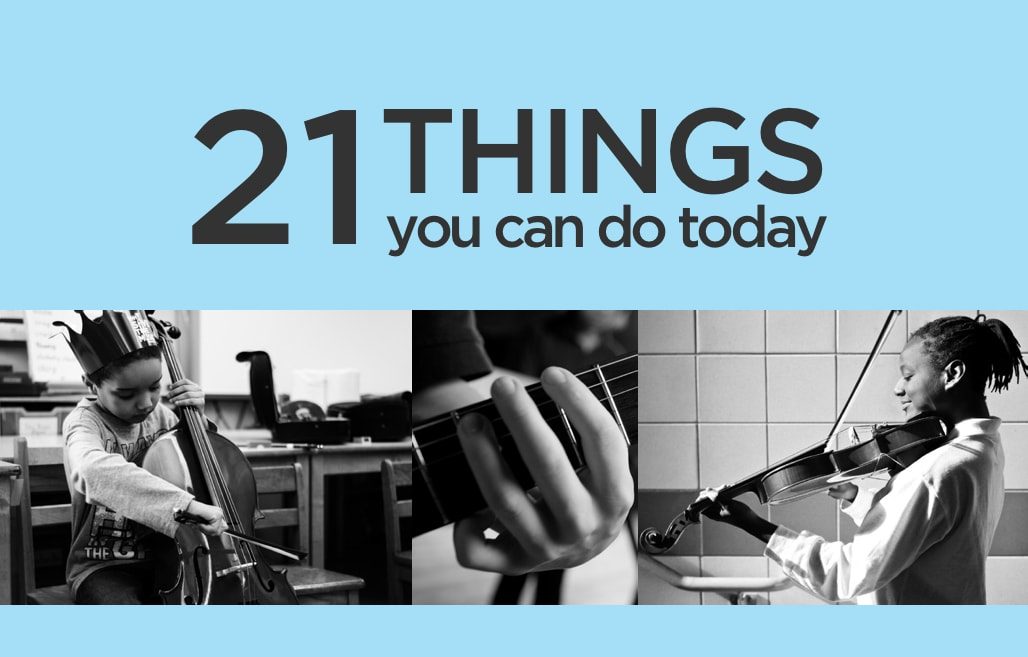#1 Connect with your local school music teachers to see how you can help support the music program. Something as simple as baking cookies for back to school night can be a tremendous help as the school year gets underway!
#2 Identify key supporters of music education including members of the school board, administration, school faculty, parents, media, and influential civic and business leaders. Build relationships with these individuals before threats to the music program are apparent.
#3 Encourage your district, school and community leaders to utilize their social media platforms and school website to highlight your school music programs and speak on the importance of music education.
#4 Ensure that your school administrators, teachers, legislators and community members know that the “Every Student Succeeds Act” includes music and the arts as an integral part of a well-rounded education. Visit aep-arts.org/essa to learn more.
#5 Schedule student performances at local commuter hubs (train station, airport, bus terminal) during peak commuting times. Be sure to have a sign with your school name and hand out information on the importance of music education and your upcoming school concerts/events.
#6 Turn a local performance into an “informance” by placing interesting facts highlighting the benefits of music education inside concert programs. Dig into our Principal’s Guide to find the latest research to pull from.
#7 Invite community leaders to your concerts, or arrange student performances at schools, PTA meetings, local businesses, the public library or City Hall. Host a reception following.
#8 Encourage school staff to be involved in your music program. Do teachers at your school play an instrument, sing or have children who study music? If so, invite them to participate in rehearsals and concerts.
#9 Sponsor an essay competition for students to write about why music is important to them. Arrange for the local newspaper to run the winning entry.
#10 Arrange for your music program to perform at local preschool, elementary, and middle schools. This will get students and their parents from your feeder schools excited about continuing their music education.
#11 Arrange for your school music program to perform at school board meetings regularly. On appropriate occasions, follow this with comments from students about why music education is important. Allow school board members to both see and hear the value of music education! Don’t wait until there is a threat to the music program.
#12 Give a speech about the importance of music education to local civic organizations such as the Kiwanis, Lions and Rotary Clubs. Invite local students to perform and share testimonials about the impact of music in their lives. Invite these civic organizations to support your music program by participating in fundraisers and attending concerts.
#13 Nominate an administrator who has demonstrated strong support for music for a “Music Education Award” given by the local or state music educators association or establish one in your district. Present this award at one of your concerts and be sure to invite school officials and community members.
#14 Create a program in which local businesses can “adopt” a music program to provide funds for extra resources. Be sure that this support is not seen as a possible replacement for district funding of the music program.
#15 Encourage your students to become music educators! Arrange for your music program to visit the music department of a local college or university. Visit with music education majors, attend classes and speak with professors.
#16 Did you know that March is “Music in Our Schools Month?” Ask your local television and radio stations to publicly recognize local music programs throughout the year and salute “Music In Our Schools Month” in March. Utilize your social media platforms and connect with MIOSM on Twitter and Instagram via #MIOSM, #MusicConnectsUs, and @NAfME.
#17 Encourage parents, students and/or influential members of the community to write an op-ed on the value of music education for your local newspaper. Invite a local news reporter to do a story or ask a newspaper to donate a full-page ad highlighting the benefits of music education.
#18 Keep all advocacy student-centered. Encourage parents and community members to become advocates for your school’s music programs and form a local coalition. For detailed information on building a coalition, visit the NAMM Foundation site to download their Grassroots Advocacy Guide.
#19 Write a letter to your Member of Congress and legislators about the value of music education in your community, highlighting the benefits and impact of music education. List upcoming local school music events during the month and invite him or her to attend.
#20 Get involved with your school district’s planning committees including curriculum, assessment and budget. Be sure music and the arts are included equally with all other academic subjects. Position music education as important in and of itself and as an instructional tool to improve student achievement and school culture
#21 Be involved in local, state and national music education organizations and the SupportMusic Coalition at www.nammfoundation.org. Contact these organizations and find out how your school music program can be involved
in conferences.
For current research of the benefits of music education and other resources, explore:
savethemusic.org | nafme.org | nammfoundation.org
artsedsearch.org | ecs.org/music-matters | americansforthearts.org
Continue to explore research in music education:

